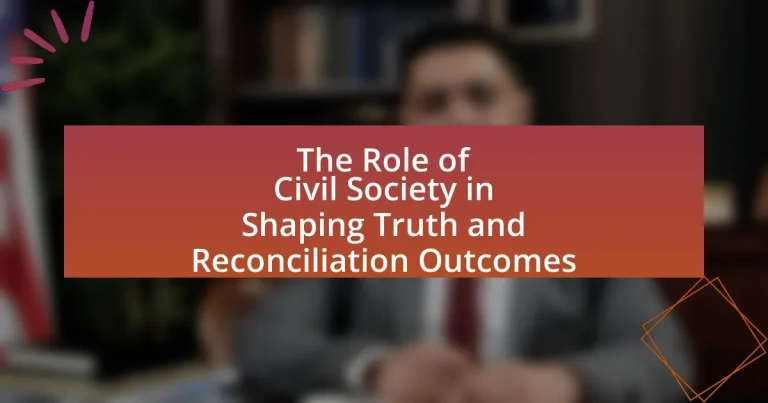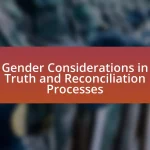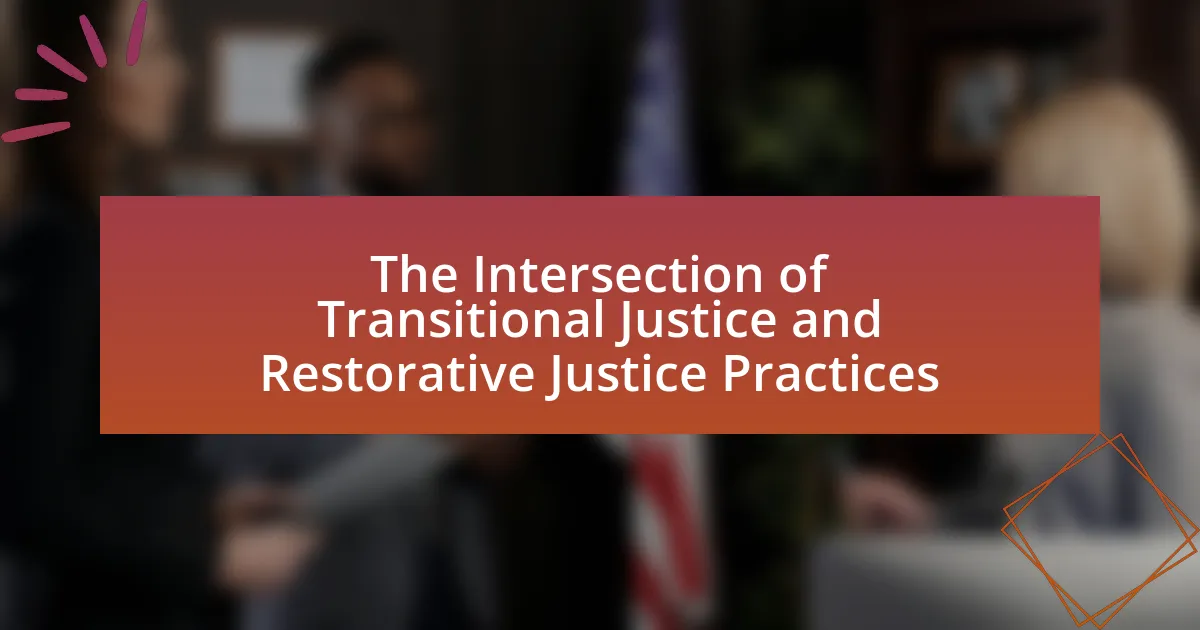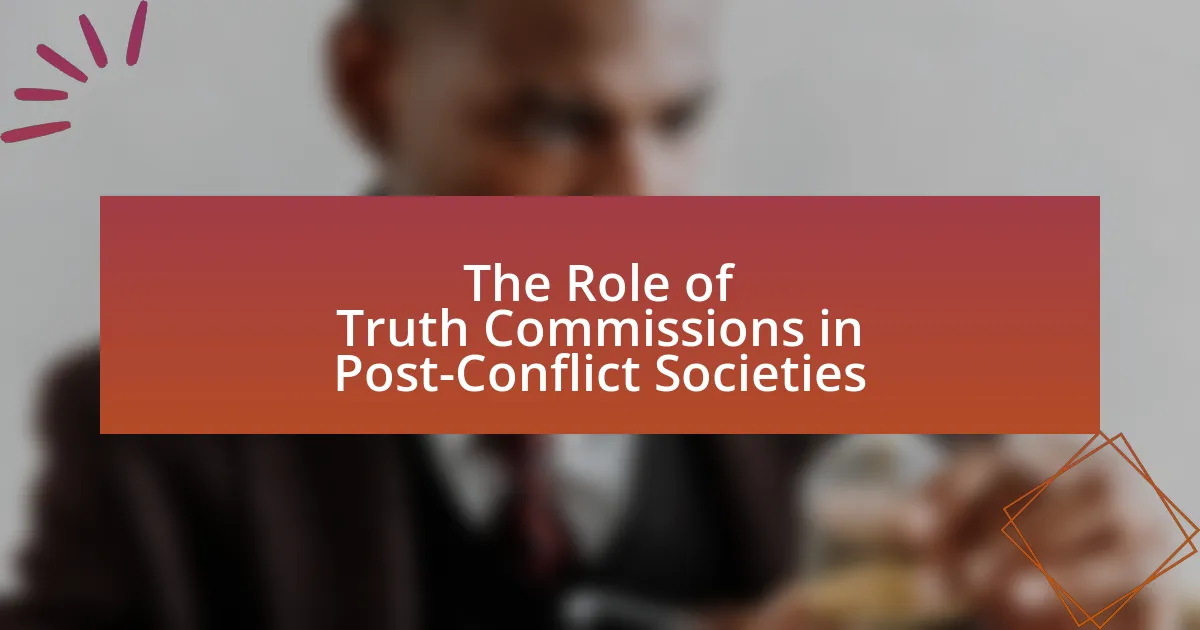Civil society plays a pivotal role in shaping truth and reconciliation outcomes by facilitating dialogue, promoting accountability, and advocating for victims’ rights. Organizations within civil society act as intermediaries between the state and affected communities, ensuring diverse voices are included in the reconciliation process. Key functions of civil society include documenting human rights abuses, fostering public discussions, and providing support services to victims. The article explores the contributions of civil society in various contexts, the challenges faced, and the strategies employed to enhance inclusivity and effectiveness in reconciliation efforts, highlighting case studies from South Africa and other post-conflict settings.
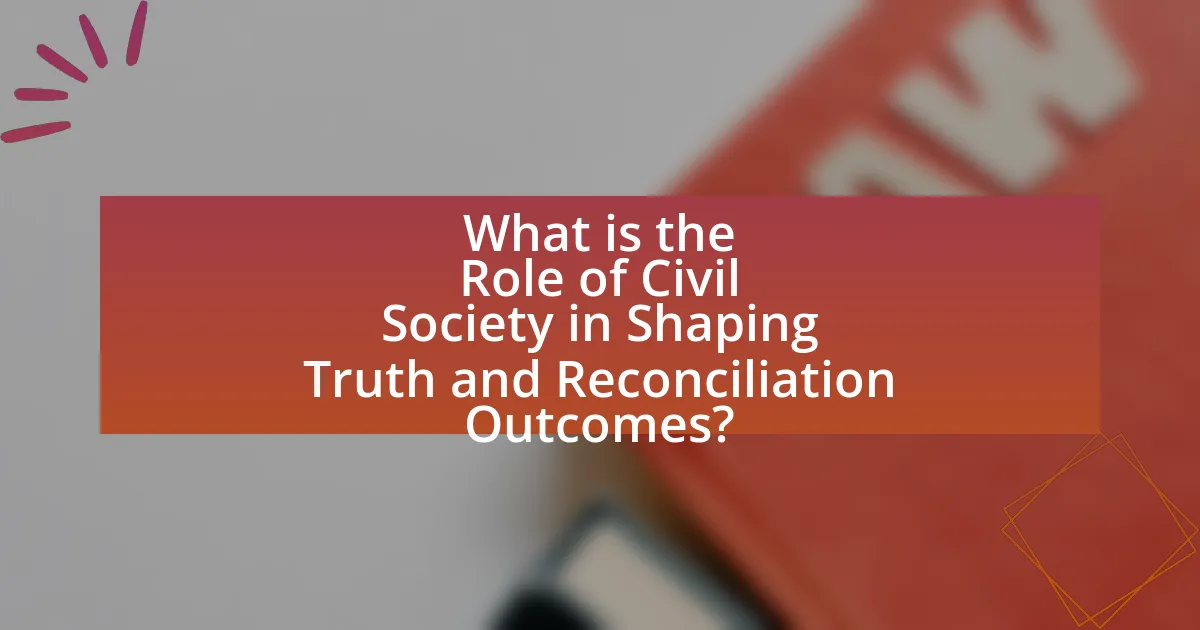
What is the Role of Civil Society in Shaping Truth and Reconciliation Outcomes?
Civil society plays a crucial role in shaping truth and reconciliation outcomes by facilitating dialogue, promoting accountability, and advocating for victims’ rights. Organizations within civil society often serve as intermediaries between the state and affected communities, ensuring that diverse voices are heard in the reconciliation process. For instance, in South Africa, civil society groups were instrumental in the Truth and Reconciliation Commission, helping to document human rights abuses and fostering public discussions that contributed to national healing. Their involvement not only enhances transparency but also builds trust among communities, which is essential for sustainable peace.
How does civil society contribute to truth and reconciliation processes?
Civil society contributes to truth and reconciliation processes by facilitating dialogue, promoting accountability, and supporting victims’ rights. Organizations within civil society often serve as intermediaries between the state and communities, ensuring that diverse voices are heard and included in the reconciliation process. For instance, in South Africa, civil society groups played a crucial role in the Truth and Reconciliation Commission by gathering testimonies from victims and advocating for restorative justice measures. This involvement not only helps to uncover the truth about past atrocities but also fosters a culture of accountability, as civil society can hold both the government and perpetrators responsible for their actions. Additionally, civil society organizations often provide support services to victims, helping them navigate the reconciliation process and access necessary resources, thereby reinforcing their rights and dignity.
What are the key functions of civil society organizations in these processes?
Civil society organizations play crucial roles in truth and reconciliation processes by promoting accountability, facilitating dialogue, and supporting victims. They advocate for justice and human rights, ensuring that the voices of marginalized communities are heard. For instance, organizations like the Truth and Reconciliation Commission in South Africa have documented human rights abuses, fostering public awareness and historical acknowledgment. Additionally, civil society groups often provide platforms for community engagement, helping to build trust and understanding among diverse populations. Their involvement is essential for creating inclusive narratives that contribute to healing and social cohesion.
How do civil society initiatives promote dialogue and understanding?
Civil society initiatives promote dialogue and understanding by facilitating inclusive discussions among diverse groups, fostering empathy, and addressing social grievances. These initiatives often create platforms for marginalized voices, enabling them to share their experiences and perspectives, which enhances mutual understanding. For example, organizations like the Truth and Reconciliation Commission in South Africa have successfully engaged communities in dialogue about past injustices, leading to greater awareness and healing. Research indicates that such initiatives can reduce conflict and build social cohesion by encouraging collaborative problem-solving and shared narratives, ultimately contributing to more peaceful societies.
Why is civil society important in post-conflict settings?
Civil society is crucial in post-conflict settings because it fosters social cohesion, promotes accountability, and supports the rebuilding of trust among communities. In the aftermath of conflict, civil society organizations often serve as intermediaries between the government and the populace, facilitating dialogue and ensuring that diverse voices are heard. For instance, research by the United Nations Development Programme highlights that civil society plays a key role in peacebuilding by engaging citizens in the reconciliation process, thereby reducing the likelihood of renewed violence. Furthermore, civil society initiatives can help document human rights abuses, contributing to transitional justice efforts and ensuring that victims’ experiences are acknowledged, which is essential for healing and moving forward.
What unique perspectives do civil society groups bring to reconciliation efforts?
Civil society groups bring grassroots insights and community-based perspectives to reconciliation efforts, emphasizing the importance of local narratives and experiences. These organizations often serve as intermediaries between affected communities and governmental bodies, facilitating dialogue that reflects the diverse voices within society. For instance, in post-apartheid South Africa, civil society played a crucial role in the Truth and Reconciliation Commission by advocating for the inclusion of marginalized voices, which helped to address historical injustices and foster healing. Their unique position allows them to highlight social injustices, promote accountability, and ensure that reconciliation processes are inclusive and representative of all societal segments.
How does civil society help in addressing historical injustices?
Civil society plays a crucial role in addressing historical injustices by advocating for marginalized voices and promoting accountability. Organizations within civil society often document human rights violations, provide platforms for victims to share their experiences, and engage in public awareness campaigns that highlight the need for justice and reparations. For instance, the Truth and Reconciliation Commission in South Africa was significantly supported by civil society groups that helped facilitate dialogue and healing processes, ensuring that the narratives of those affected by apartheid were heard and acknowledged. This involvement not only fosters a collective memory but also pressures governments to implement reforms and policies that rectify past wrongs, thereby contributing to societal healing and justice.
What challenges does civil society face in truth and reconciliation efforts?
Civil society faces significant challenges in truth and reconciliation efforts, primarily including lack of trust, political resistance, and resource limitations. Lack of trust arises from historical grievances and perceived biases, which can hinder community engagement and participation in reconciliation processes. Political resistance often manifests as government reluctance to support civil society initiatives, limiting their influence and effectiveness. Resource limitations, including funding and human capital, restrict civil society organizations’ ability to implement comprehensive programs and outreach efforts. These challenges collectively impede the ability of civil society to foster meaningful dialogue and healing in post-conflict societies.
How do political environments impact civil society’s role?
Political environments significantly influence civil society’s role by determining the level of freedom and resources available for civic engagement. In democratic settings, civil society organizations often thrive, advocating for human rights and social justice, as seen in countries like Sweden, where robust civil participation is supported by legal frameworks. Conversely, in authoritarian regimes, civil society faces repression, limiting its ability to operate effectively, as evidenced by the restrictions placed on NGOs in countries like Russia, where government control stifles dissent and civic activism. Thus, the political context shapes the capacity and effectiveness of civil society in promoting accountability and reconciliation.
What are the risks associated with civil society engagement in these processes?
Civil society engagement in truth and reconciliation processes carries several risks, including potential backlash from state actors, fragmentation within civil society, and the possibility of co-optation by political interests. Backlash from state actors can manifest as repression or hostility towards civil society organizations, undermining their ability to operate effectively. Fragmentation within civil society may occur when differing agendas lead to conflicts, weakening collective efforts and diluting impact. Co-optation by political interests can result in civil society groups losing their independence and becoming tools for political agendas, which can compromise their credibility and effectiveness. These risks highlight the complexities and challenges faced by civil society in contributing to meaningful reconciliation outcomes.
How can civil society enhance the effectiveness of truth and reconciliation outcomes?
Civil society can enhance the effectiveness of truth and reconciliation outcomes by fostering community engagement and promoting accountability. Engaged civil society organizations can facilitate dialogue among affected communities, ensuring that diverse voices are heard and included in the reconciliation process. For instance, in South Africa, organizations like the Truth and Reconciliation Commission relied on civil society to mobilize public participation, which was crucial for gathering testimonies and building trust. Additionally, civil society can hold governments accountable by advocating for the implementation of recommendations from truth commissions, as seen in countries like Argentina, where NGOs have played a vital role in pushing for justice and reparations for victims of state violence.
What strategies can civil society employ to foster inclusivity?
Civil society can foster inclusivity by implementing community engagement initiatives that actively involve marginalized groups in decision-making processes. These initiatives can include organizing forums, workshops, and focus groups that prioritize the voices of underrepresented populations, ensuring their perspectives are integrated into policy discussions. Research shows that inclusive participation leads to more equitable outcomes; for instance, the United Nations Development Programme highlights that involving diverse community members in governance enhances social cohesion and trust. By creating platforms for dialogue and collaboration, civil society can effectively address systemic inequalities and promote a more inclusive society.
How can partnerships between civil society and government improve outcomes?
Partnerships between civil society and government can improve outcomes by fostering collaboration that enhances accountability, transparency, and community engagement. When civil society organizations work alongside government entities, they can provide critical insights into community needs, ensuring that policies and programs are more effectively tailored to address those needs. For instance, research by the World Bank indicates that inclusive governance, which incorporates civil society input, leads to better public service delivery and increased citizen trust in government. This collaborative approach not only empowers communities but also strengthens democratic processes, ultimately resulting in more sustainable and equitable outcomes in areas such as truth and reconciliation efforts.
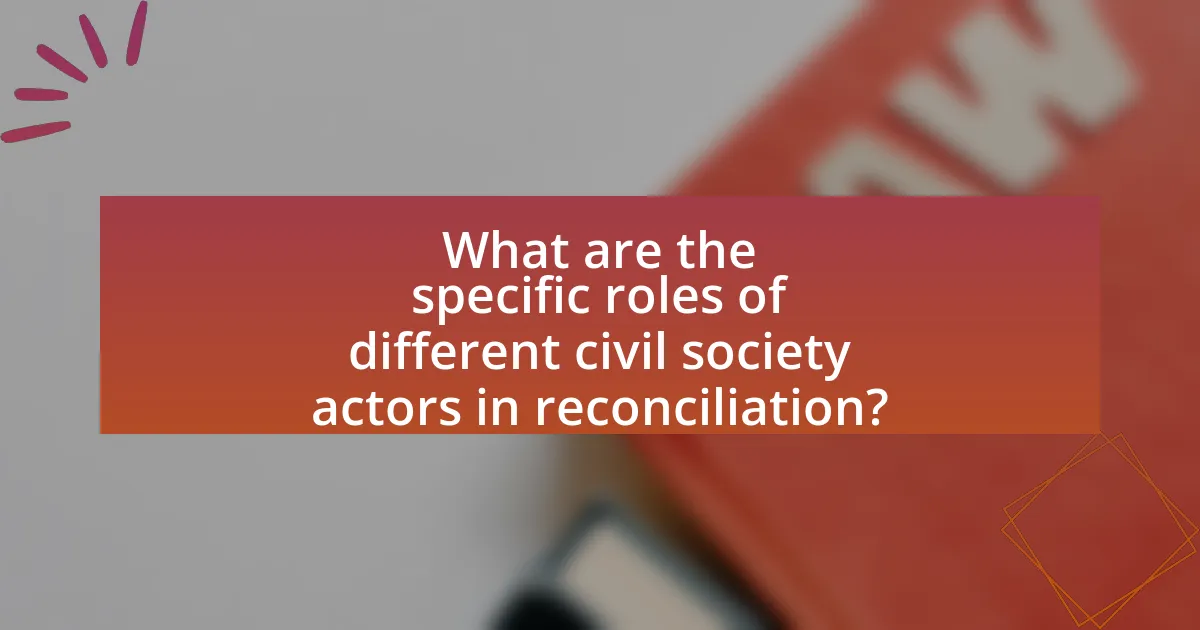
What are the specific roles of different civil society actors in reconciliation?
Different civil society actors play crucial roles in reconciliation by facilitating dialogue, promoting justice, and fostering community healing. Non-governmental organizations (NGOs) often serve as mediators, creating platforms for dialogue between conflicting parties, which is essential for understanding grievances and building trust. Grassroots organizations mobilize communities to engage in reconciliation processes, ensuring that local voices are heard and included in decision-making. Faith-based organizations contribute by promoting forgiveness and moral guidance, often helping to bridge divides through shared values. Additionally, advocacy groups work to hold governments accountable for human rights violations, pushing for reparations and policy changes that support long-term peace. These roles are supported by evidence from various reconciliation initiatives worldwide, such as the Truth and Reconciliation Commission in South Africa, which highlighted the importance of civil society in addressing past injustices and fostering national unity.
How do grassroots organizations contribute to reconciliation efforts?
Grassroots organizations contribute to reconciliation efforts by fostering community engagement and promoting dialogue among diverse groups. These organizations often serve as intermediaries, facilitating conversations that address historical grievances and build mutual understanding. For instance, in post-apartheid South Africa, grassroots initiatives played a crucial role in the Truth and Reconciliation Commission process by encouraging local participation and ensuring that marginalized voices were heard. This involvement not only helped to document personal narratives but also empowered communities to take ownership of their healing processes, thereby enhancing social cohesion and trust.
What methods do grassroots organizations use to engage communities?
Grassroots organizations engage communities through methods such as community organizing, participatory action research, and advocacy campaigns. Community organizing involves mobilizing local residents to identify issues and work collectively towards solutions, fostering a sense of ownership and empowerment. Participatory action research allows community members to actively contribute to the research process, ensuring that their voices and experiences shape the outcomes. Advocacy campaigns raise awareness and influence policy by highlighting community needs and injustices, often utilizing storytelling and data to connect with broader audiences. These methods are effective as they build trust, enhance collaboration, and promote active participation among community members, ultimately leading to more sustainable and impactful outcomes in truth and reconciliation efforts.
How do grassroots initiatives address local grievances?
Grassroots initiatives address local grievances by empowering community members to identify and articulate their specific issues, fostering collective action to seek solutions. These initiatives often create platforms for dialogue, enabling residents to voice concerns directly to local authorities or stakeholders. For example, in South Africa, community-based organizations played a crucial role during the Truth and Reconciliation Commission by facilitating discussions that highlighted local injustices and grievances, thereby influencing policy changes. This approach not only amplifies marginalized voices but also encourages accountability and transparency from those in power, leading to more effective and tailored responses to community needs.
What role do international NGOs play in shaping reconciliation outcomes?
International NGOs play a crucial role in shaping reconciliation outcomes by facilitating dialogue, providing resources, and promoting accountability in post-conflict societies. These organizations often act as intermediaries, bringing together conflicting parties to foster understanding and collaboration. For instance, NGOs like the International Crisis Group and Search for Common Ground have implemented programs that encourage community engagement and dialogue, which are essential for rebuilding trust. Additionally, international NGOs often provide funding and technical assistance to local initiatives aimed at truth-telling and reparations, thereby enhancing the capacity of local actors to address grievances. Their involvement has been shown to lead to more inclusive and sustainable reconciliation processes, as evidenced by case studies in countries such as South Africa and Rwanda, where NGO-led initiatives contributed significantly to national reconciliation efforts.
How do international NGOs support local civil society efforts?
International NGOs support local civil society efforts by providing funding, capacity-building, and advocacy resources. These organizations often allocate financial resources to grassroots initiatives, enabling local groups to implement projects that address community-specific issues. For instance, a study by the International Council on Human Rights Policy highlights that international NGOs have contributed over $1 billion to civil society organizations in conflict-affected regions, enhancing their ability to promote peace and reconciliation. Additionally, they offer training and technical assistance to strengthen the skills and knowledge of local activists, which empowers them to effectively engage in dialogue and advocacy. This multifaceted support fosters a more resilient civil society capable of influencing truth and reconciliation processes.
What challenges do international NGOs face in their involvement?
International NGOs face several challenges in their involvement, including political resistance, funding constraints, and cultural misunderstandings. Political resistance often arises from host governments that may view NGOs as threats to their authority or as foreign interference, which can lead to restrictions on operations or outright expulsion. Funding constraints limit the ability of NGOs to implement programs effectively, as they often rely on donor funding that can be unpredictable and tied to specific agendas. Cultural misunderstandings can hinder the effectiveness of NGOs, as they may not fully grasp local customs or social dynamics, leading to miscommunication and ineffective interventions. These challenges are documented in various studies, such as the “Global Trends in NGO Funding” report by the International Council of Voluntary Agencies, which highlights the impact of funding volatility on NGO operations.
How do faith-based organizations influence truth and reconciliation?
Faith-based organizations influence truth and reconciliation by providing moral authority, fostering dialogue, and facilitating healing processes. These organizations often serve as trusted intermediaries in conflict situations, leveraging their community ties to promote understanding and forgiveness among conflicting parties. For instance, in post-apartheid South Africa, faith leaders played a crucial role in the Truth and Reconciliation Commission, advocating for restorative justice and reconciliation through public testimonies and community outreach. Their involvement helped to legitimize the reconciliation process and encouraged broader societal participation, demonstrating the significant impact faith-based organizations can have in shaping outcomes in truth and reconciliation efforts.
What unique resources do faith-based organizations offer in these contexts?
Faith-based organizations offer unique resources such as community trust, moral authority, and extensive networks that facilitate dialogue and reconciliation. These organizations often have deep-rooted connections within communities, enabling them to mobilize individuals and groups effectively during reconciliation processes. For instance, faith-based organizations have historically played pivotal roles in peacebuilding efforts, such as the role of churches in the South African Truth and Reconciliation Commission, where they provided safe spaces for dialogue and healing. Their moral authority can influence public opinion and encourage participation in reconciliation initiatives, making them essential actors in civil society’s role in shaping truth and reconciliation outcomes.
How can faith-based organizations bridge divides in communities?
Faith-based organizations can bridge divides in communities by fostering dialogue and promoting understanding among diverse groups. These organizations often serve as neutral spaces where individuals from different backgrounds can come together to discuss their differences and find common ground. For instance, initiatives like interfaith dialogues and community service projects encourage collaboration and empathy, which can reduce tensions and build trust. Research shows that faith-based organizations have historically played a crucial role in peacebuilding efforts, such as in post-apartheid South Africa, where religious leaders facilitated conversations that helped heal societal rifts.
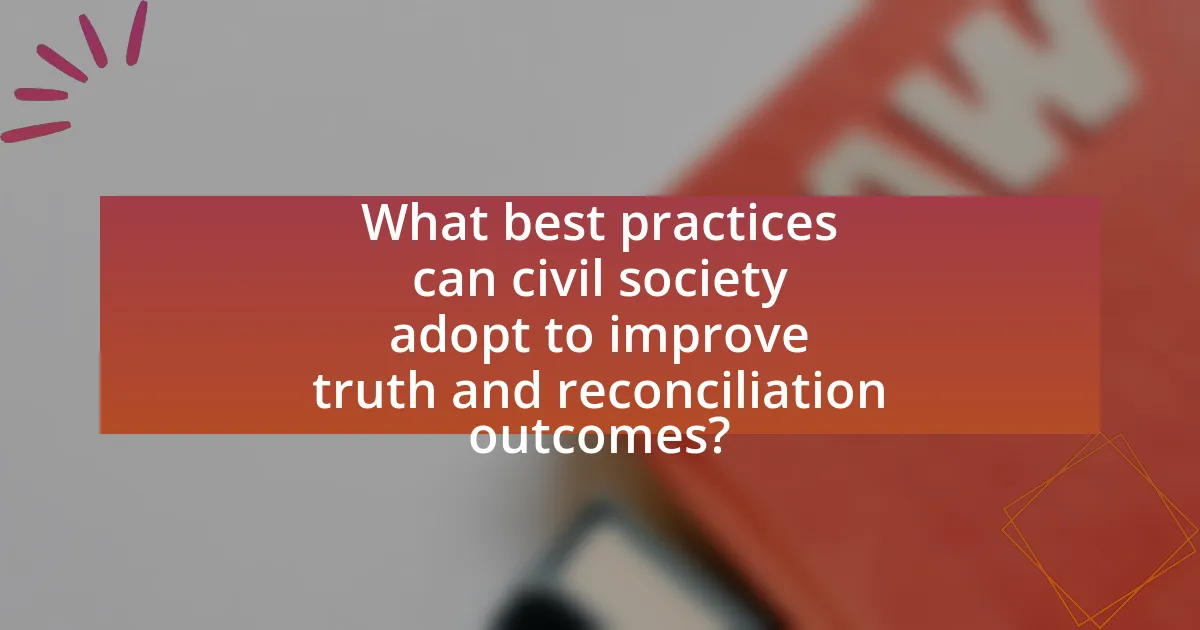
What best practices can civil society adopt to improve truth and reconciliation outcomes?
Civil society can adopt several best practices to improve truth and reconciliation outcomes, including fostering inclusive dialogue, ensuring transparency, and promoting community engagement. Inclusive dialogue allows diverse voices to be heard, which is essential for addressing grievances and building trust among conflicting parties. Transparency in processes and decision-making helps to establish credibility and accountability, as seen in the South African Truth and Reconciliation Commission, where public hearings contributed to a greater understanding of past injustices. Community engagement, through grassroots initiatives, empowers local populations to participate actively in reconciliation efforts, thereby enhancing ownership and sustainability of the outcomes. These practices collectively contribute to a more effective and meaningful reconciliation process.
How can civil society organizations effectively engage with victims and survivors?
Civil society organizations can effectively engage with victims and survivors by establishing trust through transparent communication and active listening. This engagement involves creating safe spaces for victims to share their experiences, ensuring that their voices are heard and respected. Research indicates that when organizations prioritize victim-centered approaches, such as trauma-informed care and participatory methods, they foster a sense of empowerment among survivors. For instance, the United Nations emphasizes the importance of inclusive dialogue in its guidelines for transitional justice, highlighting that meaningful participation of victims leads to more effective reconciliation processes.
What approaches ensure that victims’ voices are heard in the process?
Victims’ voices are ensured to be heard in the process through participatory mechanisms, such as victim impact statements, public hearings, and community consultations. These approaches actively involve victims in decision-making and allow them to share their experiences and perspectives. For instance, truth commissions often incorporate victim testimonies as a central component of their proceedings, which has been shown to enhance the legitimacy and effectiveness of reconciliation efforts. Research indicates that when victims are given a platform to express their narratives, it fosters a sense of agency and contributes to healing, as evidenced by the findings in the “Truth and Reconciliation Commission of Canada: Final Report” which highlights the importance of victim participation in achieving restorative justice outcomes.
How can civil society facilitate healing and closure for affected communities?
Civil society can facilitate healing and closure for affected communities by promoting dialogue, providing support services, and advocating for justice. Through organized discussions and community forums, civil society organizations create safe spaces for individuals to share their experiences, fostering understanding and empathy among community members. Additionally, these organizations often offer psychological support and counseling services, which are crucial for individuals coping with trauma. For instance, the Truth and Reconciliation Commission in South Africa highlighted the importance of community engagement in healing processes, demonstrating that inclusive participation can lead to more effective reconciliation outcomes. Furthermore, civil society plays a vital role in advocating for accountability and justice, ensuring that the voices of affected communities are heard in policy-making processes, which is essential for restoring trust and promoting long-term healing.
What role does education play in civil society-led reconciliation efforts?
Education plays a crucial role in civil society-led reconciliation efforts by fostering understanding, promoting dialogue, and addressing historical grievances. Through educational programs, civil society organizations can facilitate discussions that challenge prejudices and encourage empathy among conflicting groups. For instance, initiatives like truth commissions often incorporate educational components to inform communities about past injustices, thereby creating a shared narrative that aids in healing. Research indicates that countries with strong educational frameworks for reconciliation, such as South Africa post-apartheid, have seen more effective integration of diverse communities, highlighting education’s impact on social cohesion and long-term peacebuilding.
How can educational programs promote understanding and tolerance?
Educational programs can promote understanding and tolerance by incorporating diverse perspectives and fostering critical thinking among participants. These programs often include curricula that address historical injustices, cultural differences, and the importance of empathy, which can lead to greater awareness and appreciation of various backgrounds. For instance, studies have shown that educational initiatives that engage students in discussions about race, ethnicity, and social justice can significantly reduce prejudice and increase intergroup relations. A notable example is the “Facing History and Ourselves” program, which has demonstrated effectiveness in promoting tolerance through its focus on moral decision-making and historical context.
What types of educational initiatives have proven effective in reconciliation?
Educational initiatives that have proven effective in reconciliation include culturally relevant curricula, community-based dialogue programs, and collaborative storytelling projects. Culturally relevant curricula, which integrate local histories and perspectives, foster understanding and respect among diverse groups. Community-based dialogue programs, such as those implemented in South Africa post-apartheid, encourage open discussions about past injustices, facilitating healing and relationship-building. Collaborative storytelling projects, like those used in Canada with Indigenous communities, allow individuals to share personal narratives, promoting empathy and connection. These initiatives have been supported by research indicating that education can significantly contribute to social cohesion and conflict resolution.
What are the key lessons learned from successful civil society interventions?
Successful civil society interventions demonstrate the importance of community engagement and inclusivity in fostering trust and collaboration among diverse stakeholders. These interventions often highlight that involving marginalized groups leads to more comprehensive and representative outcomes, as seen in the South African Truth and Reconciliation Commission, where civil society played a crucial role in amplifying the voices of victims. Additionally, effective communication strategies are essential; successful interventions utilize clear messaging to educate the public and mobilize support, as evidenced by campaigns in post-conflict societies that have effectively raised awareness and driven policy changes. Lastly, sustained commitment and adaptability are vital; successful civil society organizations often adjust their strategies based on feedback and changing circumstances, ensuring their interventions remain relevant and impactful over time.
What case studies illustrate effective civil society engagement in reconciliation?
Case studies illustrating effective civil society engagement in reconciliation include the South African Truth and Reconciliation Commission (TRC) and the Guatemalan National Reconciliation Commission. In South Africa, the TRC facilitated dialogue between victims and perpetrators of apartheid, promoting healing through public testimonies and acknowledgment of past injustices, which helped to foster national unity. In Guatemala, the National Reconciliation Commission engaged civil society organizations to address the human rights violations during the civil war, leading to the establishment of a historical memory and reparations for victims, thereby contributing to societal healing and reconciliation. These examples demonstrate how civil society can play a crucial role in reconciliation processes by promoting dialogue, accountability, and healing.
How can these lessons be applied to future reconciliation efforts?
Lessons from past reconciliation efforts can be applied to future initiatives by emphasizing the importance of inclusive dialogue and community engagement. For instance, successful reconciliation processes, such as South Africa’s Truth and Reconciliation Commission, demonstrated that involving diverse civil society groups fosters trust and understanding among conflicting parties. This approach encourages transparency and accountability, essential for healing and rebuilding relationships. Furthermore, research indicates that when civil society actively participates in reconciliation, it enhances the legitimacy and effectiveness of the process, as seen in the experiences of countries like Rwanda and Colombia, where local organizations played pivotal roles in facilitating discussions and promoting restorative justice.
What practical steps can civil society take to enhance their impact on reconciliation?
Civil society can enhance their impact on reconciliation by fostering dialogue among conflicting parties, promoting inclusive participation, and supporting transitional justice mechanisms. By organizing community forums and workshops, civil society organizations can create safe spaces for individuals to share their experiences and grievances, which is essential for building mutual understanding. Research indicates that inclusive participation in reconciliation processes leads to more sustainable outcomes, as seen in the South African Truth and Reconciliation Commission, where diverse voices contributed to the healing process. Additionally, civil society can advocate for and assist in the implementation of transitional justice measures, such as truth commissions and reparations, which have been shown to address past injustices and facilitate societal healing.
